| Introduction |
|
Exciting times for N2Africa! We’re gearing up for a major workshop to mark the end of N2Africa Phase I (see the invitation from Jeroen Huising) and to make detailed plans for N2Africa Phase II (as introduced by Charlene McKoin below). The first analysis of our "early impact assessment" is yielding lots of interesting insights and we share some of those with you in this Podcaster, as well as a number of other news items and updates. I’m delighted to share some articles written by our NGO partners from CADS, Zimbabwe and SG2000, Nigeria, as well as a study on the impacts of N2Africa on nutrition security of households in northern Ghana. ...
Photo: Almaz Bombey in her field of common beans with her husband Beyene Gabiso, Shelo-Abore Kebele, Borecha southern Ethiopia
|
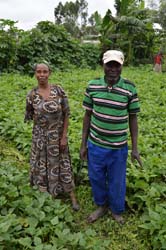 |
|
1 |
| STOP PRESS!! |
As this issue was on it’s way to be distributed we learned that the N2Africa Phase II US$25.3M grant has been officially approved!!
|
1 |
| Message from Seattle |
The Bill & Melinda Gates Foundation has supported the N2Africa project since 2009. Although proven in the context of US and Brazil, the N2Africa Phase I was the first major program to prove the efficacy of nitrogen fixation to enhance productivity at the smallholder level in Africa. During the four year project, N2Africa introduced smallholder farmers to biological nitrogen fixation by grain legumes; to the utilization of appropriate rhizobial inoculants; and to improved crop management practices to improve soil health and yields of both legumes and staple crops such as maize. ...
|
2 |
| N2Africa Phase II |
As indicated above, we have been busy the past few months with a proposal for Phase II of N2Africa. We ran a number of partnership workshops, including a workshop in Uganda where all countries were represented in June 2013, and submitted a proposal to the foundation in July. Since then we have worked closely together with our two senior project officers at the Bill & Melinda Gates Foundation, Charlene McKoin and Vi Shukla, to address a number of comments and concerns from referees. ...
|
3 |
| Rounding up Phase I of N2Africa, Hilton Nairobi, 4 November 2013 |
On November 4th, 2013, we welcome, at the Hilton Nairobi, the steering committee, our partners and stakeholders to the round-up event of the first phase of N2Africa. Four years ago, N2Africa embarked on a mission to put nitrogen fixation to work for smallholder farmers in Africa. Now, we are ready to present the results from our work over the past four years and the achievements of the project. ...
|
4 |
| Targeting legume technologies |
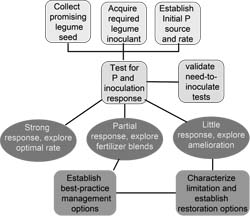 |
N2Africa has invested substantially in identifying the best grain legume varieties and appropriate management practices for integration into African farming systems. Variety trials were conducted to acquire promising varieties of bean, cowpea, groundnut and soyabean, comparing them to current lines for yield, N2-fixing capacity and adaptation to abiotic and biotic stresses. Input trials are conducted to assign the best-fit agronomic practices to the best varieties.
Figure 1. The stepwise approach to developing best-practice management options employed by N2Africa
|
|
5 |
| Early impacts of the N2Africa project |
|
The N2Africa project defined its Vision of Success for generating impacts that, given the magnitude of the constraints to agricultural development in the project countries, the innovative nature of this project, and the complexity of change dynamics, will take at least 5-10 years to achieve. Reaching the end of the first phase, we conducted an early impact assessment to establish progress made towards achieving the Vision of Success. The survey was carried out in each of the eight target countries amongst farmers who had received a technology packages in a season previous to when the survey was conducted and results were compared to results from the baseline survey conducted at the beginning of the project. ...
|
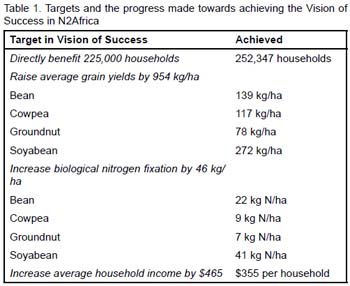 |
|
6 |
| N2Africa Social Media Communications Strategy |
Over the last few months, we have been preparing a social media strategy for N2Africa. The launch of this strategy will coincide with the November meeting, with a dedicated Facebook page as a central element. The Facebook page will promote N2Africa activity and link directly with partners and supporters, some of whom already have a social media presence. The N2Africa Facebook page will be updated regularly with videos, pictures and articles sourced from the Podcaster. If you have suggestions about what to feature, please let us know. ...
|
7 |
| CADS partnership with N2Africa in Zimbabwe |
 |
Cluster Agricultural Development Services (CADS) is a registered NGO whose work dates back to over 20 years when its predecessor VeCo Zimbabwe implemented programmes on sustainable agriculture and livestock production in Zimbabwe. CADS works with disadvantaged rural smallholder farmer organisations and its focus is to facilitate sustainable institutional strengthening, technology development, good agronomic practices, food processing, and input and output marketing. ...
Photo: A Lead farmer, Mrs Marimo, demonstrating the inoculation process, Goromonzi 2011
|
|
8 |
| SG2000 partnership with N2Africa in Nigeria |
|
Sasakawa Global 2000 is an international NGO established in 1986 in Sudan and Ghana by late Ryoichi Sasakawa (a Japanese Philanthropist) with Nobel Laureate, Dr Norman Borlaug and former US President Jimmy Carter. SG2000 works in close collaboration with national agricultural extension services, improving their field operational effectiveness and strengthening their human resources. ...
Photo: Participants discussing and exchanging ideas at different locations on the demo farm
|
 |
|
9 |
| Drawing lessons from the variability in climbing bean productivity in Rwanda |
 |
Climbing bean is a key crop in the northern Rwandan cropping system, grown by 95% of the interviewed households in the N2Africa baseline survey. N2Africa promotes the use of improved varieties and P based fertilizers in climbing bean cultivation in Rwanda. Through dissemination trials, farmers get the opportunity to test new climbing bean technologies. ...
|
|
10 |
| N2Africa proposes standards for inoculant quality |
|
N2Africa proposes standards for quality of inoculants to be adopted across countries in sub-Saharan Africa. Currently, none of the original eight countries targeted by N2Africa has regulations in place that specify requirements for the quality of inoculants, though several countries are in the process of establishing such regulatory framework. ...
Figure: The proposed grades and quality standards of legume inoculants under the N2Africa universal logo
|
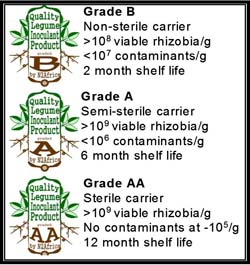 |
|
11 |
| MSc thesis on quality control of legume inoculant on bean and soyabean in East and Central Africa: Isaac Balume from DRC |
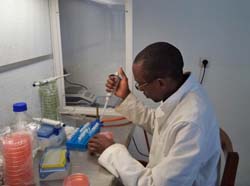 |
I did my MSc in Sustainable Soil Resource Management sponsored by N2Africa. After successfully following one year of course work ...
Photo: Serial dilution and plating
|
|
12 |
| N2Africa and its impact on human nutrition |
|
Both protein-energy malnutrition and micronutrient deficiencies are highly prevalent in sub-Saharan Africa, especially among children and women of reproductive age. Undernutrition results in substantial increases in overall disease burden and mortality, decreases in intellectual development and reduction in productivity and economic development. ...
Photo: Ilse doing height measurements
|
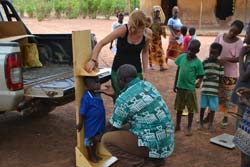 |
|
13 |
| SDSN report on Solutions for Sustainable Agriculture and Food Systems |
N2Africa received the report of the SDSN Thematic Group 7 on Solutions for Sustainable Agriculture and Food Systems. It can be downloaded from this link.
|
14 |
| Announcement IFDC international training program |
The training program The Fertilizer Value Chain – Supply System Management and Servicing Farmers’ Needs "Pathways to Optimize Stakeholder Returns in Unstable Markets" will convene in Accra, Ghana, December 2-6, 2013. For more detailed information click here and read the detailed program description.
|
15 |










